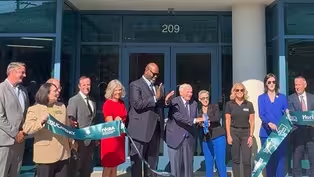
Push for Data Centers in Kentucky
Clip: Season 4 Episode 55 | 4m 21sVideo has Closed Captions
Lawmakers hear why Kentucky should become the next hub for data centers.
Kentucky's A.I. taskforce hears from business leaders and a representative of large-scale data center companies about whether Kentucky could be the next data center destination
Problems playing video? | Closed Captioning Feedback
Problems playing video? | Closed Captioning Feedback
Kentucky Edition is a local public television program presented by KET

Push for Data Centers in Kentucky
Clip: Season 4 Episode 55 | 4m 21sVideo has Closed Captions
Kentucky's A.I. taskforce hears from business leaders and a representative of large-scale data center companies about whether Kentucky could be the next data center destination
Problems playing video? | Closed Captioning Feedback
How to Watch Kentucky Edition
Kentucky Edition is available to stream on pbs.org and the free PBS App, available on iPhone, Apple TV, Android TV, Android smartphones, Amazon Fire TV, Amazon Fire Tablet, Roku, Samsung Smart TV, and Vizio.
Providing Support for PBS.org
Learn Moreabout PBS online sponsorshipArtificial intelligence.
How much is it affecting business in Kentucky, including retail and health care?
Kentucky's AI task force heard from business leaders from this week, and from a representative of a large scale data center and those companies about whether Kentucky could be the next data center destination.
Our McKinsey speak has more, and our legislative update data centers are large, warehouse like buildings that house the computers required to power everything from the apps on your phone to AI powered tools like ChatGPT.
As the demand for AI continues to grow, so does the need to build more data centers.
Lawmakers on the AI task force heard from Bartlett Cleland, who represents large scale data center companies, on why the state should want data centers built in Kentucky.
He says that along with the new tax revenue from the data centers, the jobs created would be a boost for the economy.
Think about the folks who are walking around inside that area.
Showed you who are working on the computers.
About a hundred new positions.
These positions pay six figures.
And these are for high school students, or people with high school diplomas.
Or if you had some trade school, as you can imagine, a rural area, six figure job, means that, you and you get to be home every night.
You have a different standard of living than maybe most of the folks who lived around or live around you.
And you get to stay in your home town.
Data centers require large amounts of energy to function.
According to the Department of Energy, in 2023, data centers consumed 4.4% of the electricity in the U.S., and that number could triple by 2028.
Large data centers also require large amounts of water to keep the computers cool.
But the task force was more concerned about the state's current ability to supply the necessary energy.
Water is not a problem for Kentucky.
We got more miles in navigable water than any other state but Alaska.
So water is great.
But power.
I think the enthusiasm here is that we want to scale up for the power, and we just need to know how to do it.
Obviously, you know, we've got a finite amount of generative capacity in Kentucky.
What can we do?
From your office opinion or what have you seen done to make sure that we've got enough power to, to fuel the the demand on the data centers, but also make sure we've got enough, energy for other economic development opportunities, whether it's manufacturing or, tech services or whatever.
It seems to me that there is a whole lot that can be done, should be done on how quickly, new, productivity or production of electricity can come online.
And it seems to be a large problem.
And I realize that that is a national as well as in some cases, state issue.
But I think there should be no speed wasted in trying to address those issues.
Few clear answers came from the discussion, but Cleland says the centers are becoming more energy efficient and will require less and less electricity as time goes on, and that the energy used by data centers running AI is comparable to our everyday electricity use already.
This was released by Google just, a couple of weeks ago.
One query, one AI query uses the same electricity as about nine seconds of watching television.
Nine seconds.
So think of Sunday football.
Watch a couple football games.
How much electricity has been used?
That's a whole lot of searches.
That would have been covered in that same time.
Cleland says that the state's tax environment and attitude towards tech investments were good signs that the state could be a potential building site for data centers.
He says once a company decides to start building a data center, it takes about five years to come online.
For Kentucky Edition, I'm Mackenzie Spink.
Thank you.
Mackenzie.
A large scale data center was proposed to be built in Oldham County, but in July of this year, the application was withdrawn due to public opposition.
Around environmental and financial concerns.
There is currently a moratorium on data center development in Oldham County while new regulations are developed.
Kentucky Congressman on Arrest in Charlie Kirk Shooting
Video has Closed Captions
Clip: S4 Ep55 | 2m 10s | Rand Paul on fatal shooting of conservative activist. (2m 10s)
Mitigating Violence in Schools
Video has Closed Captions
Clip: S4 Ep55 | 6m 51s | School safety experts discuss school shootings and violence prevention. (6m 51s)
Video has Closed Captions
Clip: S4 Ep55 | 2m 51s | Regional leaders cut the ribbon on the One NKY Center. (2m 51s)
Providing Support for PBS.org
Learn Moreabout PBS online sponsorship
- News and Public Affairs

Top journalists deliver compelling original analysis of the hour's headlines.

- News and Public Affairs

FRONTLINE is investigative journalism that questions, explains and changes our world.












Support for PBS provided by:
Kentucky Edition is a local public television program presented by KET


